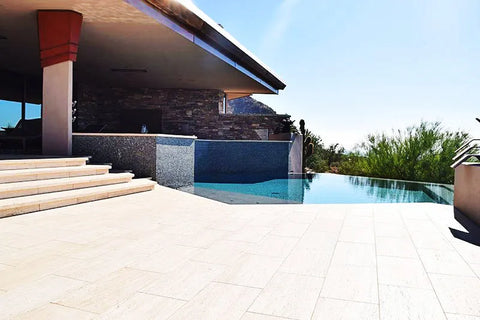It’s finally time to open up your pool for the year. One of the first things you might ask yourself is, “How long does it take to heat a pool?” Heating your pool ensures a comfortable swimming experience, making it essential to understand the timelines, factors that can impact heating, and strategies for efficient heating.
Get an estimate of how long it will take to heat your pool with our Pool Heater Calculator, and read on for tips on heating your pool efficiently.
|
Table of Contents |
Pool Heater Calculator
Estimate how long it will take to heat your pool.
Need to find your pool volume first? Use our easy Pool Volume Calculator!
What Is a Comfortable Pool Temperature?
A comfortable pool temperature depends on the activity. Here are the ideal pool temperatures for different activities:
- Leisure swimming: 78°F–82°F
- Therapeutic use: 84°F–88°F
- Competitive swimming: 77°F–79°F
Consider energy consumption when heating your pool for different activities; heating the water to higher temperatures takes more time and puts a greater strain on equipment.
How Long Does It Take Different Heaters to Heat a Pool?
Pool owners commonly rely on three different types of heaters. These include gas, electric, and solar power heaters. Let’s review the heating capabilities, ideal uses, and pros and cons of each.
How long does it take to heat a pool with a Gas Pool Heater?
Gas pool heaters have a heating speed of 1–2°F per hour and can take anywhere from 4 to 24 hours, depending on variables. This style of pool heater is ideal for quick heating and is best suited for infrequent swimmers and those in colder climates.
Gas pool heaters offer advantages such as quick heating, lower upfront costs, and no electricity required for operation. On the other hand, they have higher operating costs, shorter lifespans, and are less environmentally friendly. It's important to understand the differences between types of heaters and consider these factors when deciding between a pool heat pump vs gas heater.
How long does it take to heat a pool with an Electric Heat Pump?
Electric heat pumps have a heating speed of 0.5–1°F per hour and can typically reach desired temperatures in 12 to 24 hours. Electric heat pumps are the most energy-efficient option of the three and are best suited for regular swimmers in moderate climates.
How long does it take to heat a pool with a Solar Pool Heater?
The method that requires the most patience is the solar heater, as its heating speed depends heavily on the availability of the sun. A 10°F increase can take between 1 and 3 days, and may even take up to 5 days, depending on the pool size and the regional climate. Solar pool heaters are ideal for pools in warm, sunny climates and those seeking long-term savings.
Key Factors That Affect Pool Heating Time
You’ve asked yourself, “How long does it take for a pool to heat up?” Here are the main factors that affect heating time:
- Pool size/volume: The more gallons of water in your pool, the longer it’ll take to heat.
- Starting water temperature: If the starting water temperature is significantly colder than the desired temperature, the waiting time will be longer.
- Ambient air temperature: The air temperature of your environment plays a significant role, especially for heat pumps and solar systems.
- Heater size/output (BTUs): If the unit is undersized, you’ll experience slower heating times.
- Pool cover usage: Using a pool cover helps retain heat and reduces evaporation.
- Environmental factors: Wind, humidity, and sun exposure are naturally occurring, and their presence can affect heating times negatively or positively.
How Long Does It Take for a Pool to Heat Up Naturally?
Heating a pool naturally isn’t always the most effective option. Heating times are dependent on the availability of natural sunlight. If the area’s climate and geography aren’t in your favor, it’s challenging to obtain comfortable pool temperatures.
If the pool is uncovered, heating the pool naturally is a slow process. Typically, you’ll only see an increase of 1–3°F per day. Covered pools, on the other hand, are faster due to the cover retaining heat. Ultimately, this method isn’t reliable for maintaining consistent temperatures.

Tips for Efficient Pool Heating
No pool owner wants to wait any longer than they have to to take a dip. Fortunately, there are several strategies you can implement to speed up the heating process:
- Using a solar pool cover or liquid solar cover
- Investing in an appropriately sized heater
- Heat during the warmest part of the day (especially with heat pumps/solar)
- Schedule heating in advance of pool usage
- Regularly maintain equipment for efficiency
Pool Heater Recommendations
Looking to invest in a heater for your pool? ePoolSupply offers a comprehensive selection of top-of-the-line gas pool heaters and heat pumps. Visit ePoolSupply’s brick-and-mortar pool store in Phoenix or shop our online deals.
Exact pool heating times are dependent on factors such as the heater type, pool size, and weather conditions. With these considerations in mind, start incorporating smart heating practices into your routine. Not only will heating times be more efficient, but you’ll also save money—something every pool owner loves to hear.
FAQ: How Long Will It Take to Heat My Pool?
How long does it take to heat a pool 10 degrees?
With a gas heater, ~5–10 hours; with a heat pump, ~10–20 hours; solar may take several days.
What is the fastest way to heat a pool?
A gas heater is typically the fastest option, especially when paired with a solar cover.
Can I leave my pool heater on overnight?
Yes, but it’s more efficient to use a cover. For safety, follow manufacturer guidelines.
Does a pool heat faster with the cover on?
Yes. A cover retains heat, reduces evaporation, and speeds up heating time.
Should I keep my pool heater running all the time?
No. It’s best to run it only when needed. Use a pool cover to retain heat.
How long does it take to heat a pool with solar panels?
This varies widely, but it typically takes 1–3 days, depending on weather and system size.



